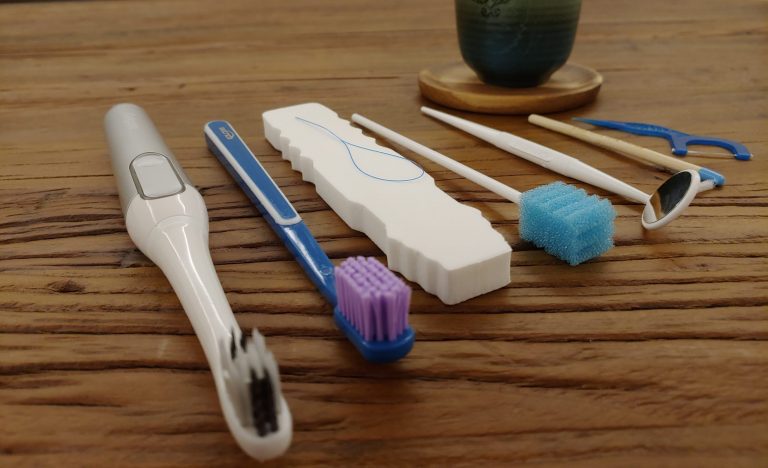Preventive Care
Prevention is at the heart of what we do at Special Needs Dental.
There are many good reasons why we place a high importance on supporting you to have good daily oral care at home, and educating you and your carers about how oral health problems develop.

Disability, chronic disease and long term medications can increase the risk of some oral diseases. Common conditions we see are tooth decay (dental caries), gum diseases (gingivitis and periodontitis), oral thrush, tooth wear, and clenching and grinding of teeth.
Managing these problems helps to prevent pain, infection and loss of teeth, and to maintain speech, chewing, self-esteem and quality of life. Reducing the amount of bacteria in the mouth also reduces your risk of pneumonia, especially if you have a high risk condition (e.g. a swallowing disorders or chronic lung condition).
Most oral health diseases are lifestyle-related, and appear earlier than other diseases with similar risk profiles (e.g. diabetes, obesity, cardiovascular diseases and dementia). By taking steps to improve oral health, we also address these risk factors that impact on wellness.
Many of our patients have difficulty with tolerating dental procedures. This leads to greater costs and difficulty accessing treatment if you require treatment under sedation or general anaesthesia. Some of you may also be at higher risk of serious health complications such as bleeding and osteonecrosis if you need extractions. By improving oral health, we minimise the need for more invasive procedures and the associated costs.
We will assess what risk factors are leading to your dental problems and provide individualised advice to help you achieve and maintain optimal oral health. We take into account how your diet, saliva and specific life circumstances impact on your oral health.
Some common recommendations we make include using specialised dental products for home care and having regular professional checks and cleaning. We aim to prevent oral disease, but when this is not realistic we need to put risk management strategies in place to slow down deterioration in oral health.
Some of you have progressive health conditions which increase the risk of dental disease over time. By having regular professional dental visits, we can monitor changes, and update your Oral Care Plan as needed. Our treatment plans adapt to your changing oral health needs.
We understand that maintaining good oral hygiene is a challenge for some people, including those with sensory differences, strong gag reflexes, aspiration risk and movement disorders. We can provide oral hygiene education to patients, family members and carers. Perfect oral hygiene is not always achievable, but working together with a positive attitude and the right advice, we can often do better.
We can provide reports and recommendations to other health and support practitioners. NDIS funding allows allied health assessment and support to work with people to address some barriers to daily oral hygiene care. This can help with sensory issues, altered muscle tone, and fine and gross motor skills. NDIS also funds oral health professionals to provide home visits to work with dental patients and their carers directly at home.
Recall visits depend the risk of dental disease. The following recall times for patients with special needs are suggested by the Australian Research Centre for Population Oral Health (ARCPOH). These are general guidelines and should be modified on an individual basis.
3 monthly: People with high risk/urgent care – those whose oral health needs to be maintained at an optimum level to avoid complex problems, including:
- people taking bone-modifying drugs (e.g. Fosamax, Prolia)
- people with heart problems that need antibiotic prophylaxis
- people with bleeding disorders
- people who are PEG-fed and are at risk of aspiration pneumonia
- AND with rapidly progressing oral disease
6 monthly: People with moderate risk/care – those whose general health is fair to good, but whose oral health is poor due to:
- inability to care for themselves (e.g. physical or cognitive issues)
- carers having difficulty caring for them (there can be carer or dental patient issues to address)
Once a year: Low risk
People who have good general and oral health, but need regular follow-up to maintain it.
Every 2 years
People without teeth. This is to monitor for oral mucosal conditions (problems with the lining of the mouth) and problems with dentures.
- Your Dental Health by Inclusion Design Lab
- A downloadable guide written for Australians with intellectual disability and their carers that outlines how to look after your teeth and gums. It describes dental care, introduces people to public and private options, and tells you what to expect during a visit to the dentist.
- The page also has videos about getting a dental check-up, types of dental equipment, and the dental x-ray machine.
- Oral Health Care for Older People by South Australia Health
- Free education resources and oral health assessment tools for carers and supervisors working with frail older people at home and in residential care facilities. Includes video demonstrations, self-assessment quizzes and downloadable guides with excellent picture
Information pamphlets by the University of Adelaide Dental Practice Research Education Unit
- Common dental problems in people with special healthcare needs
- Advice for specific problems
- People with Disabilities
- People with Dementia
- Medically Compromised Patients – feeding tubes, chemotherapy, radiotherapy, and palliative care
- Oral Cancer
- Dental Fear and Anxiety
- Diabetes